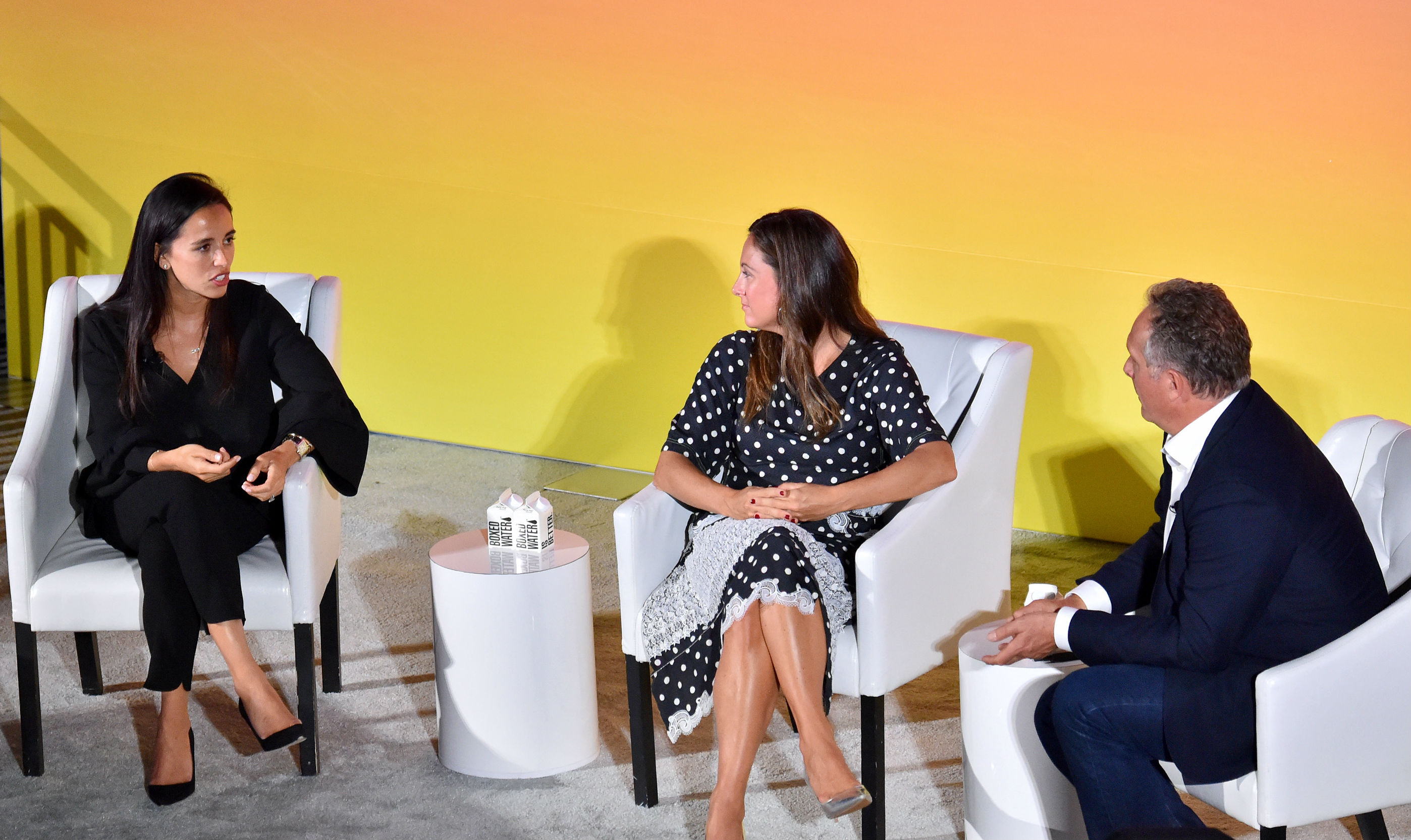Rent the Runway and Glossier on Crafting Magical Customer Experiences

The line snaking down about four flights of stairs was a clear indication that Advertising Week attendees were keen to learn the strategies behind Rent the Runway’s and Glossier’s continued successes. Those strategies boil down to two simple, yet expansive feats: listening to customers and creating magical experiences.
During the session “The New Rules for a Consumer-Led World,” hosted by Nick Brien, chief executive officer, Americas, of Dentsu Aegis Network, executives from the two direct-to-consumer (DTC) companies went into detail on how they blend data and human touches to achieve both. Maureen Sullivan, chief operations officer of Rent the Runway, and Ali Weiss, senior vice president, marketing, at Glossier, also discussed innovation, retail presence, and authenticity.
Brien kicked off the session with some level-setting insights into the DTC market. “Obviously,” he said, “the growth in the DTC market is remarkable.” Along with today’s lower barriers to entry for DTC companies, he added, over the past nine years the U.S. has experienced unprecedented growth — but more than 50 percent of the Fortune 500 have not generated growth over the past three years. Brien suggested that a lack of women in the C-suites of many of those organizations is part of the problem.
Ultimately, though, the success of today’s DTC companies comes down to their unique approach to winning, engaging, and retaining customers.
“I have another interpretation of DTC…,” Brien said. “There’s another dimension.” He described that dimension as a holistic way of doing business that includes the data fueling customer insights, the total experience across customer touchpoints, and the sense of community that many DTC brands create. “These businesses get very proximate,” he added.
All of these elements are essential in marketing to customers who expect personalized experiences and may leave if companies don’t deliver. Brien pointed out that 80 percent of consumers are more likely to do business with brands that offer them a personalized experience and 52 percent will switch due to poor personalization.
“For those of us in the agency world… are we doing enough to challenge the narrative of the coasts and middle America; the red states and blue states…? Brien asked. “I wonder how well we’re doing moving from classic demographics or descriptors to something more significant that allows us to get close [to customers,] because that’s the reality in 2030.”
Brien pointed out that the U.S. will be the first mass multicultural democracy in the world, that more and more consumers expect brands to stand for something, and that they expect businesses to value them as an individual and a member of a community versus as simply a transactional buyer of products.
With all that in mind, Brien asked Rent the Runway’s Sullivan and Glossier’s Weiss how they balance brand and performance.
“It’s a natural, classic conflict…,” Sullivan responded. “Do we care about brand or performance? Guess what, it’s both and it’s really hard and there’s constant navigation and tradeoff.” In Rent the Runway’s case, she added, to be as disciplined as possible around the total customer experience, the fashion retailer is “data-driven everything … so we can measure the impact of everything.”
Glossier is passionate about measurement, as well. Weiss explained that the beauty company makes “data-driven decisions around hearts and dollars” to determine whether they need to make the tradeoffs between the two.
Both brands also share an affinity for gathering customer input. Sullivan personally looks at every piece of app feedback to see what’s going right or wrong and to get a pulse on what customers are really saying. She called it the perfect size focus group. Rent the Runway also has a voice-of-customer (VOC) Slack channel for about 200 employees; Sullivan said it empowers them to champion the company.
Glossier has a VOC Slack group with 2,000 customers, which allows them “to talk to us and each other,” Weiss said. Those conversations increase customers’ likelihood to purchase and refer, she added.
Dentsu Aegis’s Brien surmised that these touchpoints help remove friction from the customer experience and ensure that it’s seamless.
Sullivan pointed out that listening to Rent the Runway’s community allows the company to quickly pivot to meet customers’ needs. “Referrals are our biggest customer driver,” she said, adding that 94 percent of customers come to them organically. “We feel grateful about having a community of customers that will do that.” So, the fashion retailer wants to be responsive to their needs, requests, and expectations.
Customer listening enables both brands to uncover insights that inform their decisions about marketing, product, and strategy. Rent the Runway, for example, shifted from simply “renting ballgowns” to launching an industry-first subscription clothing rental service based on responding to what amounted to an item on many customers’ wish lists. VOC also allows the company to share inventory data with its partners on what works and doesn’t for its customers; in response, many of them are customizing items specifically for Rent the Runway.
Weiss noted that Glossier has created a feedback loop that uses customer input to fuel product development, for example, which then drives further feedback. She added that one of the biggest benefits of being an experience company is that the company can quickly gather and react to feedback on product experiences, digital experiences, and offline experiences.
“Magic is magic is magic,” Sullivan interjected, describing the Glossier retail experience. “You’re leading the way in how transformative the experience … can be.”
Creating magical experiences often means blazing a new path, they asserted. “A lot of it is not following the rules,” Sullivan said. Back in 2011 when Rent the Runway launched reviews, for instance, partners were against it. Today, they’re “addicted” to the insight. Those reviews are also one of the biggest drivers of conversion.
“The voice of the customer is now so much louder than the brands could ever be,” Weiss said, adding that the most effective marketing is word of mouth.
That’s why creating those magical experiences are so crucial to both brands. Glossier doesn’t want customers to “grab and go” products from its stores, for example; the product “should almost be a souvenir of the experience,” Weiss said.
Sullivan added, “We want to make a subscription to fashion easy … it has to be magical and insanely convenient every day or else.” So, Rent the Runway will continue to innovate around making the customer experience — from rental to return — as “seamless and magical as we want it to be.”
Sullivan and Weiss agreed that technology enables their respective companies to scale authentic one-to-one relationships. One of the key aspects of that is their ability to use data to rethink and innovate their businesses while listening to and meeting customers’ expectations. “Because we collect so much data on each piece of clothing people wear,” Sullivan said, “we can create the ideal closet in the cloud.”
Photo courtesy of Advertising Week
Click the social buttons to share this story with your friends and colleagues.
The opinions and points of view expressed in this content are exclusively the views of the author and/or subject(s) and do not necessarily represent the views of MediaVillage.com/MyersBizNet, Inc. management or associated writers.


